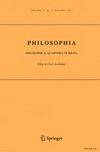隔离模型及其局限性
IF 0.5
4区 哲学
0 PHILOSOPHY
引用次数: 0
摘要
摘要:关于刑罚及其正当性,有几种较为成熟的理论。隔离模型(Pereboom和Caruso提倡)最近成为该领域最突出的理论之一,因为它否定了刑事司法的概念。这一理论声称,没有人应该受到刑事惩罚,因为从根本上说,人们不应该受到任何形式的惩罚。基于这些理由,隔离模式提出了基于公共安全考虑的丧失行为能力形式。在本文中,我们简要回顾了对检疫模型提出的一系列反对意见,并提出了一些新的或修正的论点,旨在指出其不一致和弱点。这些论点涉及(a)缺乏确定谁是危险分子的可靠方法,因此需要根据概率对禁闭作出判断,以及(b)隔离模式可能鼓励某些犯罪的前景。鉴于我们在本文中提出的论点,隔离模型被证明不像其支持者声称的那样可靠、人道和可取。本文章由计算机程序翻译,如有差异,请以英文原文为准。
The Quarantine Model and its Limits
Abstract There are several well-established theories of criminal punishment and of its justification. The quarantine model (advocated by Pereboom and Caruso) has recently emerged as one of the most prominent theories in the field, by denying the very idea of criminal justice. This theory claims that no one ought to be criminally punished because fundamentally people do not deserve any kind of punishment. On these grounds, the quarantine model proposes forms of incapacitation based on public safety considerations. In this article, we briefly review a series of objections raised against the quarantine model and propose some new or revised arguments, which are aimed at showing its inconsistencies and weaknesses. These arguments are related to (a) the lack of a reliable way of determining who is dangerous and the consequent need to make judgments about confinement based on probabilities, and (b) the prospect that the quarantine model may encourage certain crimes. Given the arguments we present in this paper, the quarantine model proves to be less solid, humane, and desirable than its proponents claim.
求助全文
通过发布文献求助,成功后即可免费获取论文全文。
去求助
来源期刊

PHILOSOPHIA
PHILOSOPHY-
CiteScore
0.90
自引率
20.00%
发文量
141
期刊介绍:
Founded in 1971, Philosophia is a much-respected journal that has provided a platform to many well-known philosophers, including Kenneth Arrow, A.J. Ayer, Roderick Chisholm, Bas van Fraassen, William Frankena, P.T. Geach, Alan Gewirth, Jaakko Hintikka, Richard Popkin, W.V.O. Quine, Gilbert Ryle, Marcus Singer, Peter Singer, J.J.C. Smart, P.F. Strawson, and many others. Philosophia also published papers of Ludwig Wittgenstein and Rudolf Carnap.
Philosophia is an international journal in scope, submissions and readership. The journal publishes contributions fitting within various philosophical traditions, but manifests a preference of the analytic tradition in the broad sense of commitment to clarity and responsibility.
Besides papers in the traditional subfields of philosophy and its history, Philosophia also publishes work on topical subjects such as racism, silence of God, terrorism, the nature of philosophy, emotion, AIDS, scientific discovery, punishment, modality, and institutional theory of art.
Philosophia welcomes a wide range of contributions to academic philosophy, covering all fields of philosophy. Contributions to the journal may take the form of topical papers, philosophical surveys of literature, symposia papers, short discussion notes, puzzles, profiles, book reviews and more extensive critical studies of new books. The journal includes a ''books revisited'' section where a book and its impact are reconsidered a decade or more after its appearance. Double-blind review procedure The journal follows a double-blind reviewing procedure. Authors are therefore requested to place their name and affiliation on a separate page. Self-identifying citations and references in the article text should either be avoided or left blank when manuscripts are first submitted. Authors are responsible for reinserting self-identifying citations and references when manuscripts are prepared for final submission.Please read our Editorial Policies carefully before you submit your paper to this journal https://www.springer.com/gp/editorial-policies
 求助内容:
求助内容: 应助结果提醒方式:
应助结果提醒方式:


